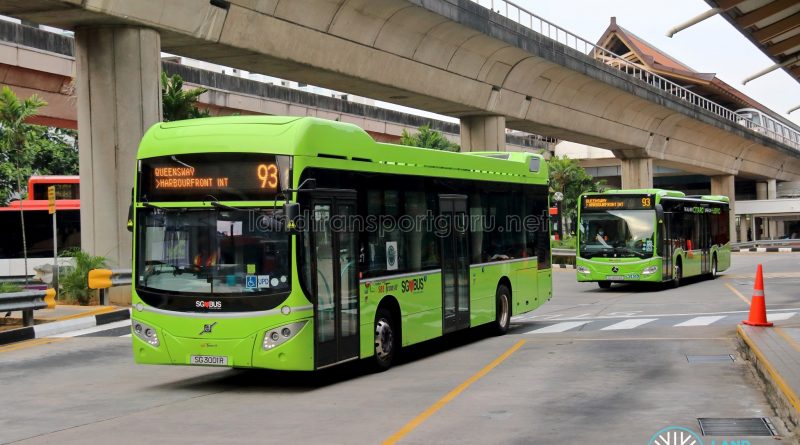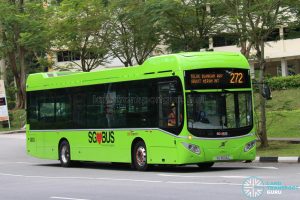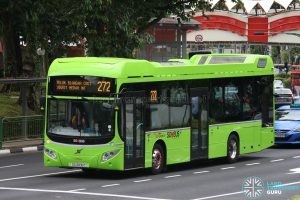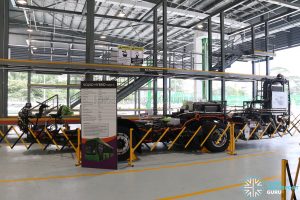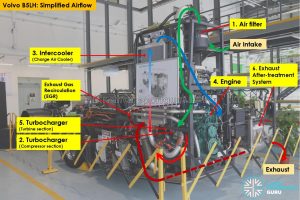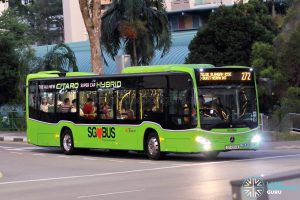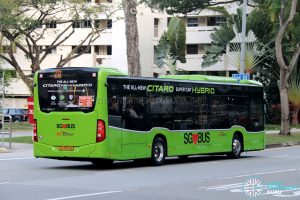Hybrid Buses, specifically diesel-electric hybrid buses, are buses that combine a conventional internal combustion engine with an electric propulsion system, with the engine typically smaller than that of traditional diesel-powered buses. To improve efficiency, electric motors on hybrid buses are used to reduce the load on the diesel engine, resulting in lower fuel consumption, lower emissions and quieter operation.
Given its environmental benefits, many cities have adopted hybrid buses for public transport. In Singapore, several one-off hybrid bus trials were organized between 2010 to 2016, but large-scale use would only come in 2018 with the Land Transport Authority (LTA) spearheading efforts to incorporate them into the public bus fleet, with the first bulk purchase of fifty Volvo B5LH buses.
Pros & Cons of Hybrid Buses
Hybrid buses are fitted with smaller-displacement engines as compared to their purely diesel-driven counterparts. As a result, hybrid buses offer significant fuel-saving benefits while reducing emissions such as CO2, nitrogen oxides and particulate matter. Many overseas trials have reported over 30 per cent improvement in fuel economy; however, the 2010 Sunlong Hybrid Bus trial in Singapore reported a figure of 25 per cent.
Despite their environmental benefits, cost is the main reason that stands in the way of widescale hybrid bus adoption, as hybrid buses carry a large price premium over conventional diesel buses. Maintenance of small fleets of hybrid buses tends to be more expensive owing to economies of scale. The Sunlong Hybrid Bus trial in 2010 reported that fuel savings were insufficient to offset the 140 per cent higher cost compared to normal diesel-powered buses.
Transition to clean energy bus fleet
As part of the Land Transport Master Plan 2040, the Land Transport Authority has also committed to a 100% cleaner energy public bus fleet, comprising alternatives like electric or hybrid buses. Moving forward, with hybrid and electric vehicles currently on trial, the LTA will is expected to make a decision regarding its preference for hybrid or electric buses ahead of mass fleet renewals of Euro III and IV buses expected in the coming years.
Types of Hybrid Buses
Hybrid buses differ in the layout of their drivetrain, which is the group of components that deliver power from a vehicle’s engine or motor to the vehicle’s driving wheels.
1: Series Hybrid
A series hybrid bus is exclusively propelled by electric traction motors. The internal combustion engine is connected to an electric generator which converts the kinetic energy produced by the engine into electric power, which is fed into the electric motors that drive the wheels of the vehicle. The generator also recharges an onboard battery pack which provides supplemental power to the motor. A computer determines how much of the power comes from the battery or the engine/generator, depending on factors such as energy demand or road conditions. Regenerative braking also helps the bus recover energy during deceleration, which is fed back into the battery pack.
Since the engine is not mechanically connected to the wheels, it is able to operate at its most optimum conditions, and can even be switched off for short periods of time for temporary all-electric operation of the bus. Series hybrids are also more expensive than parallel hybrids, as they require larger batteries and more powerful motors, but are more suited to the start-stop environment of urban traffic. No such examples exist within the Singapore public bus fleet, but popular models include the MAN Lion’s City Hybrid (MAN EfficientHybrid driveline), ADL Enviro400H (using a BAE hybrid system), the Wrightbus New Routemaster (using a Siemens hybrid system).
2: Parallel Hybrid
A parallel hybrid bus has an internal combustion engine and electric traction motor independently connected to the transmission, with both systems working in tandem to power the bus. When accelerating from stationary, the electric motor provides extra power to propel the bus, reducing the load on the engine. Regenerative braking also helps the bus recover energy during deceleration, which is fed back into the battery pack. On expressways, only the engine powers the bus.
Parallel hybrids tend to require a smaller battery pack than series-hybrid buses, relying on regenerative braking to keep them recharged. When traction power demand is low (e.g. idling while stationary), parallel hybrids also utilize the electric motor as a generator for supplemental recharging, much like an alternator in conventional cars. Several examples exist within the Singapore bus fleet, such as the Volvo B5LH, the Mercedes-Benz Citaro hybrid, and the Sunlong and Zhongtong trial units which have since been retired from service.
3: Plug-in Hybrid
Finally, the plug-in hybrid bus combines the plug-in charging capabilities of electric buses with a conventional hybrid bus drivetrain (thus, essentially hybrid buses with charging capabilities). They are similar in design to series hybrid buses, but plug-in hybrid buses come with a much larger battery capacity. The primary function of the combustion engine is as a ‘range extender’, generating additional power for the bus on the go such that it can operate for longer distances. These vehicles are able to switch over to fully-electric mode within low-emission zones.
Plug-in hybrid buses are less prevalent, but several examples exist, such as the Volvo 7900 Electric Hybrid and ADL Enviro400VE.
Hybrid Bus Models in Singapore
Sunlong SLK6121UF14H (2010)
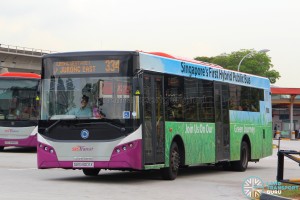
Main Article: Sunlong SLK6121UF14H
In 2010, two Sunlong SLK6121UF14H buses were brought in by ComfortDelGro Engineering, in collaboration with Shanghai Sunlong Bus Company and Gemilang Coachworks of Malaysia. They were both registered on 17 July 2010 as SBS8000Z and SBS8001X, as SBS Transit’s first-ever hybrid-electric buses.
The one year trial ran from August 2010 to 2011, which saw the buses operating on SBS Transit Bus Services 185, 334, 502 and 502A. After the end of the trial, both buses were deregistered and returned to ComfortDelgro Engineering.
SBS8001X was initially acquired by Dnata and used as an apron bus, operating within the airside areas of Changi Airport. An exemption order [Road Traffic (Changi Airport Terminal Shuttle Bus) (Exemption) Order 2012] was made to allow this bus to operate from 25th September 2012 to 31st March 2013 (both dates inclusive). It was later acquired by Travel GSH Pte Ltd and registered as PC3847Z.
SBS8000Z was acquired by private operator Republic Express and registered as PC2677D in 2014.
Both buses were de-registered in 2019.
Zhongtong LCK6121GHEV (2011)
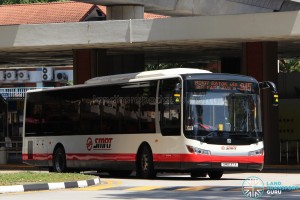
Main Article: Zhongtong LCK6121GHEV
In 2011, SMRT trialled a single Zhongtong LCK6121GHEV bus for six months. It was registered as SMB137A and operated on SMRT Bus Services from January to July 2011.
The bus operated on various bus services during the trial, such as 106, 188, 190, Premium 530, 941 and 945.
Following the successful tender for three PPSS services, private operator Travel GSH Pte Ltd acquired the bus and re-stickered it into a green and white livery which promoted the hybrid properties of the bus. The bus was re-registered as PC2086J and plied Service 291P from 2014 to 2016.
The bus was de-registered in 2019.
Volvo B5RLE Hybrid (2015 & 2016)
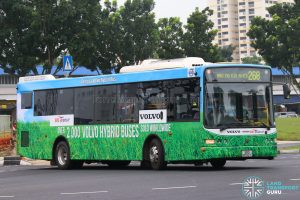
Main Article: Volvo B5RLE Hybrid
A single Volvo B5RLE Hybrid bus was brought in by Volvo Buses for SBS Transit around 2014. The bus was spotted in Hougang Bus Depot in full white livery in early 2014. The bus was registered in February 2015 as SBS8002T.
SBS Transit was permitted to operate the Volvo B5RLE for the duration of one year (15 Sep 2014 to 14 Sep 2015, both dates inclusive) under the Road Traffic (Volvo Diesel Hybrid Bus Trial) (Exemption) Order 2014. The bus was limited to routes 143, 143A, 174, 174e, 185, 334 and 506. However, the bus only operated on revenue service from March to September 2015, on services 506, 185 and 143.
In February 2016, under the Road Traffic (Volvo Diesel Hybrid Bus Trial) (Exemption) Order 2016, SBS Transit was permitted to operate the bus in the period of 12 Feb 2016 to 28 Aug 2016, for bus services 13/A, 21/A, 26, 29/A, 38, 45/A, 54, 63, 70/A/B/M, 73, 124, 130, 131/A, 135/A, 139, 145/A, 155/A, 162/M , 222/A, 265, 268/A, 269/A, 293 and 410G/W. During the second trial period, the bus only operated on services 268 & 13.
Volvo B5LH (2018–)
Main Article: Volvo B5LH
50 units of the Volvo B5LH bus, bodied with the MCV eVoRa bodywork, progressively entered revenue service from 10 December 2018.
Announced during the Ministry of Transport’s Committee of Supply Debate in March 2017, tenders were called for the purchase of 50 hybrid buses and 60 electric buses that year, for which Volvo Buses secured the contract. The medium-scale rollout will allow the LTA to expand its trial of such “green” vehicles, which while environmentally-friendly, are more costly and less suitable for the island’s tropical climate. Not only do green vehicles operating in Singapore consume a lot of energy for air-conditioning, their batteries and hybrid systems also work less efficiently in our warm and humid environment.
Check out our article, Volvo B5LH – Chassis and Technical Overview, for comprehensive technical coverage of the Volvo B5LH.
Mercedes-Benz Citaro hybrid (2020-2021)
Main Article: Mercedes-Benz Citaro hybrid
One unit of the Mercedes-Benz Citaro hybrid is operated on Singapore roads as a trial unit, registered SG4004B. As a mild hybrid bus, it pairs the parallel hybrid drivetrain with a supercapacitor as the energy storage medium. Unlike full-hybrid vehicles, mild hybrids like the Citaro hybrid are incapable of electric-only propulsion but feature a much more lightweight and compact hybrid system.
Under the Road Traffic (Authorisation of Use) Notification 2020, SG4004B is permitted to operate on Bus Services 93 and 272, both of which are operated by SBS Transit. The authorization is valid from 9 March 2020 to 8 March 2021 (both dates inclusive). Revenue service on 13 March 2020, with 8 March 2021 being the last day of operations.
Also, check out:
Further Reading:
- Sunlong SLK6121UF14H
- Zhongtong LCK6121GHEV
- Volvo B5RLE Hybrid
- Volvo B5LH
- Mercedes-Benz Citaro hybrid
